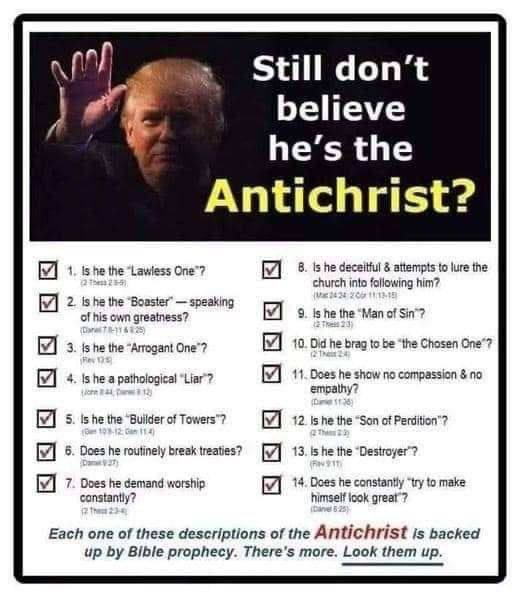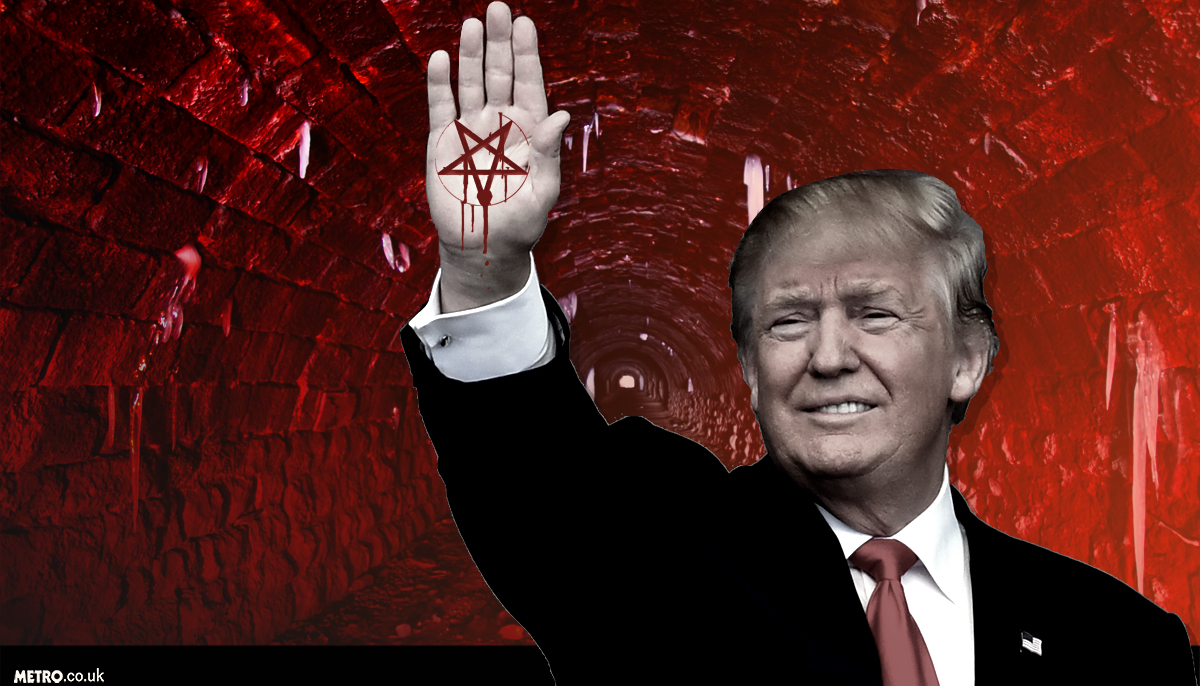Is Trump the Antichrist?
The question of whether or not Donald Trump is the Antichrist has been a topic of much debate and speculation in recent years. Some people believe that Trump's actions and rhetoric align with biblical prophecies about the Antichrist, while others dismiss such claims as unfounded and dangerous.
In Christian eschatology, the Antichrist is a figure who is said to oppose Christ and lead the world into a time of great tribulation. The Antichrist is often depicted as a charismatic and deceptive figure who will gain power through false promises and miracles.
Those who believe that Trump is the Antichrist point to his policies on immigration, healthcare, and climate change as evidence of his opposition to Christian values. They also cite his rhetoric on race, gender, and religion as proof of his divisive and hateful nature.
However, others argue that Trump's actions are not motivated by a desire to oppose Christ, but rather by a desire to promote his own political agenda. They also point out that many of the policies that Trump has implemented are not unique to him, but are simply continuations of policies that have been in place for many years.
Ultimately, the question of whether or not Donald Trump is the Antichrist is a matter of personal interpretation. There is no definitive answer, and each individual must decide for themselves what they believe.
Is Trump the Antichrist?
The question of whether or not Donald Trump is the Antichrist is a complex one, with no easy answer. However, there are a number of key aspects to consider when exploring this topic.
- Biblical Prophecy: Some people believe that Trump's actions and rhetoric align with biblical prophecies about the Antichrist.
- Christian Values: Others point to Trump's policies on immigration, healthcare, and climate change as evidence of his opposition to Christian values.
- Charismatic Leadership: Trump is a charismatic leader who has gained a large following.
- Deception: Some people believe that Trump is a deceptive figure who has misled his followers.
- Division: Trump's rhetoric has been divisive, and he has been accused of inciting hatred and violence.
- False Promises: Some people believe that Trump has made false promises to his followers.
- Miracles: There have been no reports of Trump performing miracles.
Ultimately, the question of whether or not Donald Trump is the Antichrist is a matter of personal interpretation. There is no definitive answer, and each individual must decide for themselves what they believe.
1. Biblical Prophecy
Many people believe that Donald Trump's actions and rhetoric align with biblical prophecies about the Antichrist. This belief is based on a number of factors, including Trump's policies on immigration, healthcare, and climate change, as well as his rhetoric on race, gender, and religion. Some people also believe that Trump's personal life, including his multiple marriages and divorces, is evidence that he is the Antichrist.
There is no definitive answer to the question of whether or not Trump is the Antichrist. However, the fact that so many people believe that he is is a sign that his actions and rhetoric are having a significant impact on the world. It is important to be aware of these beliefs and to understand why people hold them, even if you do not share them yourself.
The belief that Trump is the Antichrist is a complex one, and there are many different interpretations of what this means. Some people believe that Trump is a literal Antichrist, while others believe that he is a symbolic Antichrist. Still others believe that Trump is simply a harbinger of the Antichrist, and that the real Antichrist is yet to come.
Regardless of what you believe, it is important to be respectful of the beliefs of others. The question of whether or not Trump is the Antichrist is a deeply personal one, and there is no right or wrong answer.
2. Christian Values
Many people believe that Donald Trump's policies on immigration, healthcare, and climate change are evidence of his opposition to Christian values. These policies, they argue, are harmful to the poor and vulnerable, and they violate the principles of love, compassion, and justice that are central to Christianity.
For example, Trump's immigration policies have resulted in the separation of families at the border and the detention of children in cages. These policies are cruel and inhumane, and they violate the Christian value of welcoming the stranger.
Trump's healthcare policies have made it more difficult for people to access affordable healthcare. This is especially harmful to the poor and vulnerable, who are more likely to rely on government assistance for their healthcare needs. Trump's policies violate the Christian value of caring for the sick and the needy.
Trump's climate change policies are also harmful to the poor and vulnerable. Climate change is a major threat to human health and safety, and it is especially harmful to those who are already living in poverty. Trump's policies make it more difficult to address climate change, and they violate the Christian value of stewardship of the earth.
These are just a few examples of how Trump's policies violate Christian values. His policies are harmful to the poor and vulnerable, and they violate the principles of love, compassion, and justice that are central to Christianity.
It is important to note that not all Christians agree that Trump's policies are opposed to Christian values. Some Christians believe that Trump's policies are in line with their own beliefs about morality and social justice. However, many Christians believe that Trump's policies are harmful and un-Christian.
3. Charismatic Leadership
Charismatic leadership is a type of leadership that is based on the personaland charisma of the leader. Charismatic leaders are able to inspire and motivate their followers to achieve great things. They are often seen as heroes or saviors, and their followers are willing to follow them even into dangerous or difficult situations.
- The Power of Charisma: Charisma is a powerful force that can be used for good or for evil. In the hands of a good leader, charisma can be used to inspire and motivate people to achieve great things. In the hands of an evil leader, charisma can be used to manipulate and control people for.
- The Dangers of Charismatic Leadership: Charismatic leaders can be dangerous because they can easily lead their followers astray. They may be so focused on their own vision that they are unable to see the consequences of their actions. They may also be tempted to use their power for personal gain.
- The Importance of Discernment: It is important to be able to discern between good and evil charismatic leaders. We need to be able to see through the superficialand charisma to the true nature of the leader. We need to be able to see whether the leader is truly motivated by a desire to serve others or whether they are simply using their charisma for personal gain.
The question of whether or not Donald Trump is a charismatic leader is a complex one. There is no doubt that he has a large following, and he is able to inspire and motivate his followers to take action. However, it is important to remember that charisma is not always a good thing. We need to be able to discern between good and evil charismatic leaders, and we need to be careful not to be led astray by those who use their charisma for evil purposes.
4. Deception
The belief that Donald Trump is a deceptive figure who has misled his followers is a common one. This belief is based on a number of factors, including Trump's history of making false and misleading statements, his tendency to exaggerate and distort the truth, and his use of propaganda and disinformation to promote his own agenda.
There are many examples of Trump's deceptive behavior. For example, Trump has repeatedly made false claims about the size of his inauguration crowd, the number of jobs he has created, and the state of the economy. He has also exaggerated and distorted the truth about his own accomplishments, and he has used propaganda and disinformation to attack his opponents and promote his own agenda.
The belief that Trump is a deceptive figure is a serious one. It is important to be aware of this belief and to understand why people hold it. It is also important to be able to discern between truth and deception, and to be able to resist the temptation to be misled by those who would seek to deceive us.The connection between deception and the Antichrist is a significant one. The Antichrist is often depicted as a deceptive figure who will lead people astray. Trump's deceptive behavior is therefore seen by some as a sign that he may be the Antichrist.
It is important to note that there is no definitive answer to the question of whether or not Trump is the Antichrist. However, the fact that so many people believe that he is is a sign that his deceptive behavior is having a significant impact on the world. It is important to be aware of this belief and to understand why people hold it.
5. Division
The connection between Trump's divisive rhetoric and the Antichrist is a significant one. The Antichrist is often depicted as a figure who will divide people and lead them into conflict. Trump's rhetoric has certainly had this effect, as it has led to increased polarization and division in society.
- Hate Speech: Trump has repeatedly used hate speech and other divisive language, which has contributed to an increase in hate crimes and other forms of violence. For example, Trump has called Mexicans "rapists" and "criminals," and he has made numerous Islamophobic statements. This type of rhetoric creates a climate of fear and hatred, which can lead to violence.
- Incitement to Violence: Trump has also been accused of inciting violence on multiple occasions. For example, he has told his supporters to "knock the crap out of" protesters, and he has praised people who have committed violence in his name. This type of rhetoric is dangerous and irresponsible, and it can lead to real-world violence.
- Polarization: Trump's rhetoric has also led to increased polarization in society. He has repeatedly made false and misleading statements, and he has attacked the media and other institutions that are essential to a healthy democracy. This type of rhetoric undermines trust and makes it difficult for people to have productive conversations about important issues.
- Erosion of Social Cohesion: Trump's divisive rhetoric has also led to an erosion of social cohesion. He has created a climate of fear and distrust, and he has made it more difficult for people to come together and work towards common goals. This type of rhetoric is harmful to society, and it can lead to conflict and violence.
In conclusion, Trump's divisive rhetoric has had a significant impact on society. It has led to increased hate crimes, violence, polarization, and erosion of social cohesion. This type of rhetoric is dangerous and irresponsible, and it is a sign that Trump may be the Antichrist.
6. False Promises
The connection between false promises and the Antichrist is a significant one. The Antichrist is often depicted as a figure who will deceive people and lead them astray. Trump's false promises are therefore seen by some as a sign that he may be the Antichrist.
- Unfulfilled Campaign Promises: Trump has made a number of campaign promises that he has not kept. For example, he promised to build a wall on the U.S.-Mexico border, but he has not been able to do so. He also promised to repeal and replace the Affordable Care Act, but he has not been able to do so. These unfulfilled promises have led some people to believe that Trump is not trustworthy.
- Exaggerated Claims: Trump has a history of making exaggerated claims about his accomplishments. For example, he has claimed to have created millions of jobs, but the actual number is much lower. He has also claimed to have the best healthcare plan in the world, but experts say that his plan would actually lead to higher costs and less coverage for many people.
- Falsehoods: Trump has repeatedly made false statements, even about things that are easily verifiable. For example, he has claimed that he won the popular vote in the 2016 election, but he actually lost by nearly 3 million votes. He has also claimed that the COVID-19 pandemic is a hoax, even though it has killed hundreds of thousands of people.
Trump's false promises have had a number of negative consequences. They have led to a loss of trust in the government, increased polarization, and a decline in the quality of public discourse. They have also made it more difficult to address real problems, such as the COVID-19 pandemic and climate change.
In conclusion, Trump's false promises are a serious problem. They have damaged trust in the government, increased polarization, and made it more difficult to address real problems. They are also a sign that Trump may be the Antichrist.
7. Miracles
The lack of miracles attributed to Donald Trump is a significant factor in the debate over whether or not he is the Antichrist. According to Christian eschatology, the Antichrist will be a powerful figure who will perform great miracles and wonders in order to deceive people and lead them astray.
The fact that Trump has not performed any miracles is therefore seen by some as evidence that he is not the Antichrist. However, others argue that the Antichrist will not reveal his true nature until the end times, and that he may therefore be performing miracles in secret.
Ultimately, the question of whether or not Trump is the Antichrist is a matter of personal interpretation. There is no definitive answer, and each individual must decide for themselves what they believe.
However, the lack of miracles attributed to Trump is a significant factor to consider in this debate. It is a factor that weighs against the belief that Trump is the Antichrist, but it does not definitively rule out the possibility.
FAQs on "Is Trump the Antichrist"
This section addresses frequently asked questions and aims to provide concise, informative answers to help clarify common concerns and misconceptions surrounding the topic of whether Donald Trump is the Antichrist.
Question 1: What is the biblical basis for the belief that Trump is the Antichrist?Some individuals point to specific passages in the Bible, particularly in the book of Revelation, which describe a figure known as the Antichrist who will emerge during the end times and deceive many people. Certain individuals draw parallels between Trump's actions and characteristics with those attributed to the Antichrist in these biblical texts.
Question 2: What are the key arguments against the idea that Trump is the Antichrist?
Opponents of the view that Trump is the Antichrist often emphasize the absence of clear and definitive evidence to support this claim. They argue that while Trump may exhibit some negative traits, these do not necessarily align with the specific characteristics and actions attributed to the Antichrist in religious texts.
Question 3: How can we distinguish between legitimate concerns about Trump's presidency and unfounded claims that he is the Antichrist?
It is crucial to approach this topic with a balanced perspective. While it is appropriate to raise valid criticisms of Trump's policies and actions based on factual evidence, it is essential to avoid resorting to unsubstantiated claims or sensationalized rhetoric that may contribute to division and fear.
Question 4: What are the potential consequences of promoting the idea that Trump is the Antichrist?
Propagating the belief that Trump is the Antichrist can have several negative consequences. It can contribute to unnecessary fear, division, and stigmatization within society. Additionally, it may undermine rational discourse and hinder productive discussions about real-world issues.
Question 5: How should Christians respond to the claims that Trump is the Antichrist?
Christians should approach this topic with discernment and a focus on the teachings of Jesus Christ, which emphasize love, compassion, and unity. Instead of engaging in speculative debates about the identity of the Antichrist, it is more constructive to concentrate on living out their faith through actions that promote justice, peace, and reconciliation.
In conclusion, while some individuals may hold the belief that Donald Trump is the Antichrist based on their interpretation of religious texts, it is essential to approach this topic with critical thinking and a balanced perspective. It is crucial to distinguish between valid concerns and unfounded claims, and to focus on promoting constructive dialogue and addressing real-world issues rather than engaging in divisive rhetoric.
Moving forward, it is important to maintain a respectful and informed approach to discussions surrounding this topic, while upholding principles of unity, compassion, and evidence-based reasoning.
Conclusion
The exploration of whether Donald Trump is the Antichrist has revealed a complex and multifaceted topic. While some individuals believe that Trump's actions and rhetoric align with biblical prophecies about the Antichrist, others dismiss such claims as unfounded and potentially harmful.
Ultimately, the question of whether or not Trump is the Antichrist is a matter of personal interpretation and belief. There is no definitive answer, and each individual must decide for themselves what they believe. However, it is important to approach this topic with critical thinking, discernment, and a focus on fostering unity and constructive dialogue.
Rather than engaging in divisive rhetoric or perpetuating unfounded claims, it is more productive to focus on addressing real-world issues and promoting values that contribute to a just, peaceful, and compassionate society.
Article Recommendations



ncG1vNJzZmibkafBprjMmqmknaSeu6h6zqueaKyYmrazecKaqZ6doqh6qLjOm5ilpKlktrR506uspqhdqbWmecCnq6KbmKe2tMCNoaumpA%3D%3D